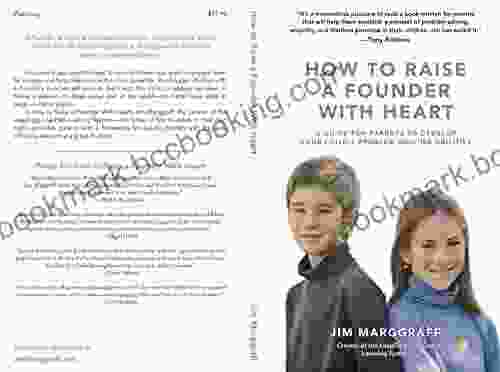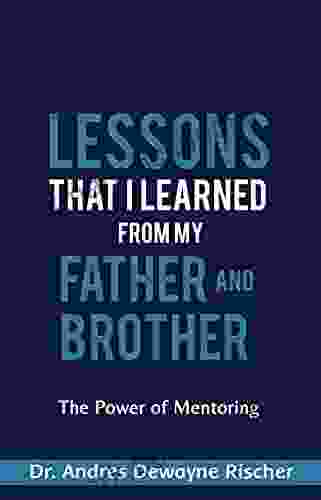Unlocking Human Potential: The Transformative Power of Mentoring

In a rapidly evolving world, where individuals and organizations strive for excellence, the significance of mentorship has emerged as a cornerstone for personal and professional growth. "The Power of Mentoring: Empowering Individuals and Transforming Lives" delves into the transformative nature of mentoring, exploring its potential to ignite human potential and drive societal progress.
Defining Mentorship
Mentoring is a reciprocal relationship between an experienced individual (the mentor) and a less experienced individual (the mentee). It involves the exchange of knowledge, skills, and support, fostering the mentee's development and empowering them to reach their full potential. Mentorship extends beyond mere instruction; it encompasses guidance, inspiration, and a deep commitment to the mentee's well-being and success.
4.9 out of 5
| Language | : | English |
| File size | : | 539 KB |
| Text-to-Speech | : | Enabled |
| Screen Reader | : | Supported |
| Enhanced typesetting | : | Enabled |
| Word Wise | : | Enabled |
| Print length | : | 72 pages |
Benefits of Mentorship
Research has consistently demonstrated the profound benefits of mentorship for both mentors and mentees. Studies have shown that mentees who participate in formal mentoring programs experience:
- Enhanced career progression: Mentors provide invaluable career advice, skill development opportunities, and networking connections, accelerating mentees' career trajectories.
- Improved job satisfaction: Mentors offer support, encouragement, and a sense of belonging, fostering a positive and fulfilling work environment for mentees.
- Increased confidence and self-esteem: Mentors instill confidence in mentees, helping them recognize their strengths, overcome challenges, and reach their full potential.
- Enhanced knowledge and skills: Through knowledge sharing and practical guidance, mentors empower mentees to acquire new skills, expand their expertise, and stay ahead in their field.
- Improved problem-solving abilities: Mentors provide mentees with different perspectives, helping them develop critical thinking skills, solve problems effectively, and make informed decisions.
Mentors also benefit from the mentoring relationship:
- Increased leadership skills: Mentorship provides mentors with opportunities to develop their leadership skills, as they guide and support mentees.
- Enhanced communication skills: Mentors learn to communicate effectively with individuals from different backgrounds and experiences, fostering their interpersonal skills.
- Sense of purpose and fulfillment: By investing in the growth of others, mentors experience a sense of purpose and fulfillment, contributing to a positive and impactful legacy.
Types of Mentorship
Mentorship can take various forms, depending on the specific needs and goals of the individuals involved. Common types of mentorship include:
- Formal Mentoring: Structured programs matching mentors and mentees with specific objectives and performance measures. Formal mentoring often occurs within organizations, educational institutions, or professional associations.
- Informal Mentoring: Unstructured relationships that develop naturally between individuals based on mutual respect and a desire to support each other's growth.
- Peer Mentoring: Relationships between individuals with similar levels of experience or expertise, providing mutual support and guidance.
- Cross-Cultural Mentoring: Mentorship that bridges cultural differences, fostering cultural awareness and understanding.
Establishing Successful Mentoring Relationships
Building a successful mentoring relationship requires careful consideration and ongoing effort from both mentors and mentees. Key elements include:
- Clarity of Purpose: Clearly define the goals and expectations of the mentorship relationship, ensuring alignment and a shared understanding.
- Communication: Establish open and regular communication channels, fostering a trusting and supportive environment.
- Mutual Respect: Recognize and appreciate the unique contributions and perspectives of both the mentor and the mentee.
- Feedback and Accountability: Provide constructive feedback and hold each other accountable for progress and growth.
- Flexibility: Adapt the mentorship relationship over time to meet evolving needs and goals.
Mentoring in Practice
Mentorship has found widespread application across various sectors, including:
- Business and Industry: Organizations use formal and informal mentoring programs to develop leadership talent, improve employee engagement, and foster innovation.
- Education: Mentors support students in their academic journey, providing guidance, encouragement, and a connection to the professional world.
- Community Development: Mentors empower individuals from underserved communities to overcome barriers, achieve their goals, and contribute to the well-being of society.
- Personal Growth: Mentors provide support and guidance to individuals seeking personal development, career transitions, or navigating life challenges.
"The Power of Mentoring" illuminates the transformative nature of mentoring, highlighting its ability to unlock human potential, empower individuals, and drive societal progress. By fostering meaningful connections between experienced and less experienced individuals, we create a ripple effect that reverberates throughout our communities and organizations. By engaging in mentoring, we sow seeds of growth, cultivate a culture of support and inclusivity, and pave the way for a future where everyone has the opportunity to reach their full potential.
Call to Action
Unlock the transformative power of mentoring in your life and the lives of others. Join a mentoring program, seek out mentorship opportunities, or become a mentor yourself. Together, let us build a society where mentoring is the norm, empowering individuals to achieve their dreams and shape a brighter future for all.
4.9 out of 5
| Language | : | English |
| File size | : | 539 KB |
| Text-to-Speech | : | Enabled |
| Screen Reader | : | Supported |
| Enhanced typesetting | : | Enabled |
| Word Wise | : | Enabled |
| Print length | : | 72 pages |
Do you want to contribute by writing guest posts on this blog?
Please contact us and send us a resume of previous articles that you have written.
 Book
Book Novel
Novel Page
Page Chapter
Chapter Text
Text Story
Story Genre
Genre Reader
Reader Library
Library Paperback
Paperback E-book
E-book Magazine
Magazine Newspaper
Newspaper Paragraph
Paragraph Sentence
Sentence Bookmark
Bookmark Shelf
Shelf Glossary
Glossary Bibliography
Bibliography Foreword
Foreword Preface
Preface Synopsis
Synopsis Annotation
Annotation Footnote
Footnote Manuscript
Manuscript Scroll
Scroll Codex
Codex Tome
Tome Bestseller
Bestseller Classics
Classics Library card
Library card Narrative
Narrative Biography
Biography Autobiography
Autobiography Memoir
Memoir Reference
Reference Encyclopedia
Encyclopedia Jeremy Zenith
Jeremy Zenith Lauren Tarshis
Lauren Tarshis Newest Edition Kindle Edition
Newest Edition Kindle Edition Jenny Heijun Wills
Jenny Heijun Wills Jennifer Thompson Cannino
Jennifer Thompson Cannino Martha Bergland
Martha Bergland Jennifer Michaels
Jennifer Michaels Nft Trending Crypto Art
Nft Trending Crypto Art Peter Zheutlin
Peter Zheutlin Margaret Wise Brown
Margaret Wise Brown Rick Stein
Rick Stein Jenny Carr
Jenny Carr Jenna Guarneri
Jenna Guarneri Jennifer Swanson
Jennifer Swanson Sharon Creech
Sharon Creech Sid Brettell
Sid Brettell Jenna Hunterson
Jenna Hunterson Renia Spiegel
Renia Spiegel Jeffrey Hoffstein
Jeffrey Hoffstein Wolfgang Daunicht
Wolfgang Daunicht
Light bulbAdvertise smarter! Our strategic ad space ensures maximum exposure. Reserve your spot today!
 Guillermo BlairFollow ·7.4k
Guillermo BlairFollow ·7.4k Robert Louis StevensonFollow ·12.3k
Robert Louis StevensonFollow ·12.3k Yukio MishimaFollow ·8.9k
Yukio MishimaFollow ·8.9k Dennis HayesFollow ·4.9k
Dennis HayesFollow ·4.9k Isaac AsimovFollow ·16.1k
Isaac AsimovFollow ·16.1k Leo TolstoyFollow ·5k
Leo TolstoyFollow ·5k Nathan ReedFollow ·11.3k
Nathan ReedFollow ·11.3k Leon FosterFollow ·3.5k
Leon FosterFollow ·3.5k

 Patrick Rothfuss
Patrick RothfussGuide for Parents: Unlocking Your Child's Problem-Solving...
As a parent, you...

 Ignacio Hayes
Ignacio HayesThe Good Girls of Al Noor: A Gripping Tale of Hope and...
On March 15, 2019, a...

 Lee Simmons
Lee Simmons50 Games and Activities for All the Turkeys at Your...
Thanksgiving is a time for family, friends,...

 Sean Turner
Sean TurnerRewiring the World: From Edison to Google - The...
A Captivating...
4.9 out of 5
| Language | : | English |
| File size | : | 539 KB |
| Text-to-Speech | : | Enabled |
| Screen Reader | : | Supported |
| Enhanced typesetting | : | Enabled |
| Word Wise | : | Enabled |
| Print length | : | 72 pages |
















